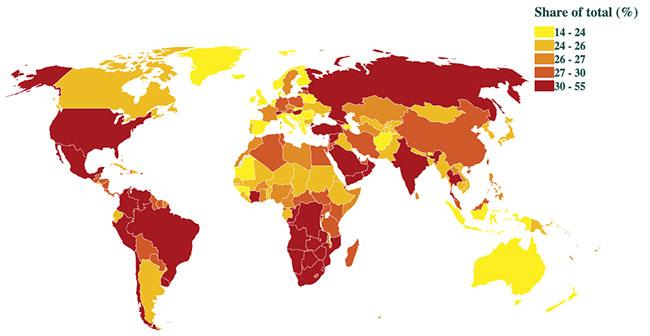Even Sky-High Income Tax Rates Won’t Stop the Relentless Rise of the Richest
As governments around the world grapple with widening income inequality, many have turned to progressive taxation as a potential remedy. Yet, even in countries where income tax rates soar into the stratosphere, the wealthiest individuals continue to amass fortunes at an unprecedented rate. This paradox raises critical questions about the efficacy of tax policy and the structural factors that sustain wealth accumulation. From Silicon Valley tech moguls to global finance titans, the richest are not just weathering the storm of high taxes; they are flourishing in it. This article delves into the data and trends that illustrate how the top echelons of wealth are not just surviving, but thriving amid fiscal measures designed to level the playing field. As discussions about tax reform heat up, understanding this relentless rise of the rich is more crucial than ever.
The Impact of Progressive Taxation on Wealth Inequality
The implementation of progressive taxation aims to mitigate wealth inequality by imposing higher tax rates on individuals with higher incomes. However, the effectiveness of this approach is often called into question. Despite soaring tax brackets reaching levels that would make the wealthiest cringe, the most affluent have found ways to preserve and even enhance their fortunes. This occurs through various avenues, such as tax loopholes, offshore accounts, and deductions that are more accessible to the wealthy than to average earners. While the tax system is designed to redistribute wealth, the reality is that many high earners continue to amass wealth at an unprecedented rate, further entrenching their economic power.
On analyzing wealth distribution, it becomes evident that income tax rates alone do not dictate overall wealth inequality. The top 1% has managed to accumulate a substantial share of national wealth, in some countries exceeding even historical proportions. Consider the following factors contributing to this phenomenon:
- Asset Appreciation: Investments in real estate, stocks, and alternative assets often yield higher returns compared to traditional earnings.
- Inheritance and Trust Funds: Wealth passed down through generations maintains and amplifies the financial power of elite families.
- Political Influence: Higher income individuals often have the means to shape tax policy in their favor, capitalizing on systems designed to protect their wealth.
Strategies to Mitigate the Wealth Gap Amid Soaring Tax Rates
As the wealth gap yawns ever wider despite soaring tax rates, innovative strategies are emerging to level the economic playing field. Progressive taxation, while essential, is not the sole solution; it must be complemented with other measures to ensure the equitable distribution of resources. Governments can consider implementing wealth taxes and inheritance taxes, targeting the ultra-wealthy who often find ways to circumvent income taxes through loopholes. Furthermore, promoting universal basic income (UBI) could offer a safety net, ensuring that even the lowest-income families have a baseline to build wealth over time.
Beyond policy changes, fostering financial literacy is key. Educating individuals about investments, savings, and asset management can empower them to make informed decisions that contribute to wealth accumulation. Community investment initiatives, such as cooperatives and community land trusts, can also create environments where residents collectively benefit from local economic growth. These strategies, when designed for inclusivity, can help bridge the gap that tax rates alone cannot close and truly create opportunities for widespread prosperity.
Exploring Policy Innovations for Fairer Wealth Distribution
As income inequality reaches unprecedented levels, innovative policy solutions are emerging as potential remedies to ensure a more equitable distribution of wealth. Traditional approaches, such as raising income tax rates on the wealthy, have often failed to significantly alter the economic landscape. Instead, policymakers are exploring alternatives that focus on structural changes, aimed at redistributing wealth more effectively. These innovative policies include:
- Universal Basic Income (UBI): A guaranteed income for all citizens, providing financial security and reducing poverty.
- Wealth Taxes: Implementing taxes on wealth rather than income, targeting assets and property holdings of the ultra-rich.
- Progressive Tax Structures: Designing tax brackets that disproportionately tax higher earners while protecting low and middle-income households.
- Access to Education and Training: Investing in programs that empower individuals with skills necessary for high-demand jobs.
Another area of focus is the implementation of inclusive economic policies that engage marginalized groups in wealth creation. This can be achieved through various initiatives aimed at empowering local communities and small businesses. For instance, local government grants and funding programs can support innovation hubs that foster entrepreneurship. Consider the potential impacts illustrated in the table below:
| Policy Initiative | Potential Impact | Targeted Beneficiaries |
|---|---|---|
| Universal Basic Income | Reduces poverty, boosts local economies | All citizens, especially low-income groups |
| Wealth Taxes | Generates revenue for social programs | Low-income households |
| Support for Small Businesses | Creates jobs, stimulates growth | Entrepreneurs, local communities |
The Way Forward
In conclusion, the data presented underscores a compelling reality: even amidst the specter of soaring income tax rates, wealth accumulation among the richest individuals continues unabated. This trend raises important questions about the effectiveness of current taxation policies and the broader implications for economic inequality. As governments worldwide grapple with how to address the growing chasm between the affluent and the average citizen, it is evident that mere tax hikes may not suffocate the financial ascent of the wealthy elite. Policymakers will need to explore more comprehensive approaches if they hope to stem the tide of inequality while fostering a more equitable economic landscape. Moving forward, the challenge will be to balance the scales without stifling innovation and growth, ensuring that prosperity is not a luxury only for those at the top.









